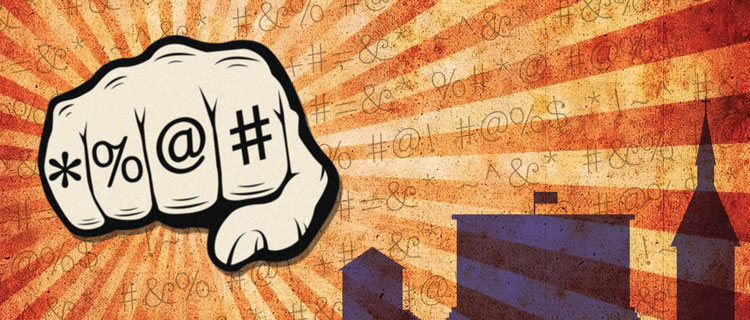Can anti-profanity laws and the fighting words doctrine be squared with the First Amendment?

Illustration by Sara Wadford
In an age of declining civility and amplification of offensive speech via social media, it may seem strange, un-American or downright silly for people to be arrested for uttering profane speech. But it happens.
People can, and have been, arrested for uttering profanity in public, cursing in a canoe, engaging in a toilet tirade in their own home, or cursing near a school or church.
Anti-profanity laws remain on the books in some states with statutes that in many cases are relics of a bygone era, dating back to the 19th century but never erased. A 1962 South Carolina law prohibits cursing on a public highway or within hearing distance of a church or school. A Mississippi law, passed in 1848, prohibits using profane or vulgar language in the presence of two or more people. Those in violation can receive a $100 fine or up to 30 days in county jail. A Rhode Island law, enacted in 1896, provides that: “Every person who shall be guilty of profane swearing and cursing shall be fined not exceeding five dollars ($5.00).”
“In my opinion, laws banning profanity are unconstitutional on their face,” says Jennifer Kinsley, who teaches First Amendment law at Northern Kentucky University’s Salmon P. Chase College of Law. “The sole justification for these laws is morality-based, which the Supreme Court has held insufficient to justify laws regulating fundamental rights.”
How can anti-profanity laws be considered constitutional in the wake of the U.S. Supreme Court’s famous decision in Cohen v. California (1971), where the court reversed the breach-of-the-peace conviction of Paul Robert Cohen, who wore a jacket with the message “Fuck the Draft” into a Los Angeles county courthouse? Justice John Marshall Harlan II began his opinion with these words: “This case may seem at first blush too inconsequential to find its way into our books, but the issue it presents is of no small constitutional significance.” He also famously wrote that “one man’s vulgarity is another’s lyric” and warned that government officials might ban particular four-letter words as a way to silence particular viewpoints.
The reason why such laws are sometimes considered constitutional is the fighting words doctrine—words that the Supreme Court defined in Chaplinsky v. New Hampshire (1942) as “words which by their very utterance inflict injury or cause an immediate breach of the peace.” Walter Chaplinsky, a Jehovah’s Witness, was convicted of breach of the peace for cursing a marshal.
The high court unanimously upheld his conviction, writing that fighting words “are of such slight social value as a step to truth that any benefit that may be derived from them is clearly outweighed by the social interest in order and morality.”
IN YOUR FACE
In later decisions, the court narrowed the doctrine by limiting it to direct, face-to-face personal insults and by construing such laws narrowly to only fighting words. For example, in Cohen, the court pointed out that the man did not direct the message on his jacket to any particular individual. Justice Lewis Powell also explained in a concurring opinion in Lewis v. New Orleans (1972) that speech directed to police officers may not rise to the level of fighting words because officers receive special training to be able to deal with obstreperous individuals.
While the U.S. Supreme Court has reversed the convictions in its fighting words cases, the doctrine remains active in the lower courts.
The 4th U.S. Circuit Court of Appeals at Richmond, Virginia, upheld South Carolina’s anti-profanity law in 2016 in Johnson v. Quattlebaum, affirming the conviction of Krystal Johnson, who had called the police to a house where she was staying to get help in obtaining her car keys from a family member. While the police were there, Johnson allegedly said: “This is some motherfucking shit.”
The officer arrested her under the state anti-profanity law. Her problem: She was within 50-60 yards of a local church. The 4th Circuit upheld her conviction, writing that the law is neither unconstitutionally overbroad or vague because it only applies to fighting words.
This article was published in the April 2018 issue of the ABA Journal with the title "Fighting Words: Can anti-profanity laws be squared with the First Amendment?"



